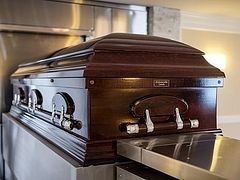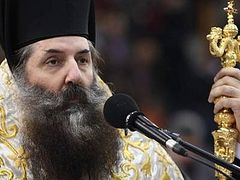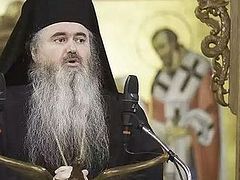Ritsona, Greece, October 11, 2019
Though cremation was legalized in Greece 13 years ago, the traditionally-Orthodox nation did not have any crematoriums actually carrying out the blasphemous act, as the movement has faced considerable opposition from the influential Orthodox Church which forbids cremation.
However, after decades of hard resistance from the Greek Orthodox Chruch, the first crematorium in Greece is now operational. The facility opened in Ritsona, in Viotia, about 45 miles north of Athens.
According to a report yesterday from Ekathimerini, the facility, opened on September 30, has already carried out 15 cremations, while a report published today by channelnewsasia.com states that around 30 have already been carried out.
The facility was licensed in the summer of 2018. It is jointly owned by Crem Services SA and the nongovernmental Greek Cremation Society (GCS).
“Changing funerary customs is one of the hardest and slowest shifts that any society can make,” said GCS president Antonis Alakiotis, adding, “Our country... is unfortunately the last in the European Union to acquire a crematorium.”
In March, Greece’s Environment and Energy Minister Giorgios Stathakis signed a decision to allow the construction of what at that time was thought to be the nation’s first crematorium, in Athens. The cities of Thessaloniki and Patras have also consented to having a crematorium, though work there has been slow.
Several hierarchs of the Greek Church spoke out strongly when Patras made the decision in 2016 to open a crematorium, calling it “war against the Church.”
Metropolitan Justin of Kalamaria, commenting on the decision to open the crematorium, said: “Many claim that the Church should care for people’s souls only and leave the body alone. That is not true: the Church cares for the whole human being who is saved in his or her psychosomatic unity, gaining the Divine grace.
The body is holy and sacred for the Church, because it was created by God! The Lord Himself took this body, resurrected and ascended to the Heavens in it. Can there be a greater glory for the body?”
Metropolitan Chrysostomos of Patras emphasized the inconsistency of cremation with the teaching of the Orthodox Church: “God created man in His own image, as a psychosomatic unity. The union between the soul and the body is holy, and it is no coincidence that Apostle Paul calls our body ‘a temple of the Holy Spirit’… When separated from the soul, the body does not become a corpse, as is the case with dumb animals, but it becomes ‘relics’. Cremation of the dead demonstrates nihilism, while burial shows respect for the personality of the deceased… In the end, cremation of human bodies is a sign of lack of faith in resurrection.”




